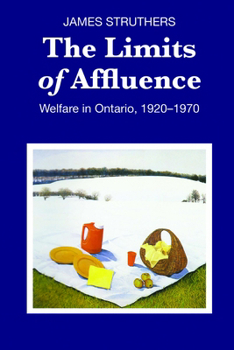The Limits of Affluence: Welfare in Ontario, 1920-1970
With its roots in nineteenth-century poor relief, welfare is Canada's oldest and most controversial social program. No other policy is so closely linked to debates on the causes of poverty, the meaning of work, the difference between entitlement and charity, and the definition of basic human needs. The first history of welfare in Canada's richest province offers a new perspective on our contemporary response to poverty.
Struthers examines the evolution of provincial and local programs for single mothers, the aged, and the unemployed between 1920 and 1970, when the modern welfare state first took shape. He analyses the roles of social workers; women's groups; labour and the left; federal, provincial, and local welfare bureaucrats; and the poor themselves. The Story evolves through depression, war, and unprecedented postwar affluence. A wealth of detail supports this account of all the forces that have shaped welfare policy; bureaucratic imperatives, political professionals, the unemployed, labour unions, federal-provincial relations, provincial-municipal relations, and the spirit of the times.
Based on extensive primary research, this definitive work covers much new ground, providing an indispensable reference on Ontario's social welfare history
(The Ontario Historical Studies Series)





